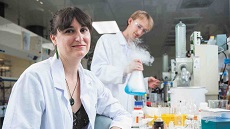Copying tuberculosis could yield vaccines against malaria and cancer
Victoria University chemists Bridget Stocker and Mattie Timmer's research into tuberculosis may eventually form part of a vaccine for malaria.

Future vaccines might one day contain a tiny whisker of tuberculosis, to boost their power.
Victoria University chemists Bridget Stocker and Mattie Timmer's research into tuberculosis may eventually form part of a vaccine for malaria, one of the biggest challenges for medical researchers today.
One of the difficulties they face is in hitting the right note between the body overreacting or underreacting, Timmer said. "Too much can be dangerous."
But underreacting to a vaccine means the body's immune system "memory" of the disease will be weaker, so immunity will not last as long. Something added to a vaccination that will make the body sit up and take notice – and keenly remember – would be a valuable tool for health researchers.
The Marsden-funded pair believed a chemical, found on the little-studied outer surface of the tuberculosis bacterium, might be just such a tool, Timmer said.
People are born with their immune systems primed to recognise this surface and fight the disease – once the leading cause of death in the Western world, infecting the lungs, lymph nodes, bones, joints and kidneys.
"We can find out what those [chemical] structures are, and then make them, and make modifications to see if we can improve the activity."
Stocker and Timmer would spend about three years creating and testing sister chemicals of this tuberculosis molecule. Their aim was strike a balance between something that effectively activated the immune system but was also simple to make, he said.
The final product would be inspired by the tuberculosis chemistry, but made from scratch in the lab before being included in the vaccine, Stocker said. "It might freak people out, but all we're doing is looking at the molecules on the outside of the bacteria."
The chemical has none of the infection-causing parts of tuberculosis, so no one would be at risk of developing the disease should it be included in a vaccine, Timmer said. "The vaccine can be against anything: pathogens and bacteria and anti-cancer vaccines."
Through her work, Stocker had seen the fears that small numbers of people had about the safety of vaccines. While all would be subject to thorough, independent safety tests, she wondered if a product derived from a "natural" source might be accepted more easily by a chemical-averse public.
"People assume because it's natural it's better. But it's just a perception."
One of the first uses of the research might be in a planned vaccine for malaria, Stocker said. "It was why I got into science – to be able to contribute something."
- Stuff
